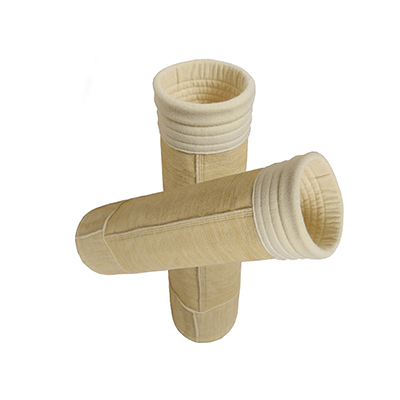Aramid Filter Bag
Aramid filter bags are used for high-temperature dust and particle removal in demanding industrial settings, are made by needle-punching aramid fibers, offering exceptional heat resistance and durability.
Description
Aramid filter bags are used for high-temperature dust and particle removal in demanding industrial settings. They are made by needle-punching aramid fibers, offering exceptional heat resistance and durability.
Here’s a more detailed look at Aramid needle felt filter bags:
Manufacturing and Properties:
- Material: These bags are constructed from 100% aramid fibers, such as Nomex®, which are needle-punched to create a robust, non-woven felt fabric.
- Needle Punching: The aramid fibers are mechanically interlocked through the needle-punching process, resulting in a strong and porous filtration medium.
- Treatments:
- While aramid is inherently heat-resistant, additional treatments can be applied to enhance specific properties:
- Hydrolysis Resistance: Treatments can be applied to improve resistance to moisture related degradation.
- Chemical Resistance enhancement: Specific coatings can be applied to increase resistance to particular chemicals.
- Construction: The felt fabric is precisely cut and sewn into bags, typically with a snap ring or other attachment mechanism for secure installation onto filter cages.
- Durability: These bags are renowned for their exceptional resistance to high temperatures, abrasion, and chemical exposure, ensuring a long service life.
- Dimensional Stability: Aramid fibers maintain their shape and size under high temperatures, providing consistent filtration performance.
- Temperature Resistance: Aramid filter bags can withstand continuous operating temperatures up to approximately 204°C (400°F), with short-term temperature spikes reaching higher.
- Fire Retardancy: Aramid fibers inherently resist burning.
Applications:
- Cement Industry: Used for filtering dust from kiln exhaust and other high-temperature processes.
- Asphalt Plants: Essential for removing particulate matter from hot asphalt mixing fumes.
- Steel Mills and Smelting Plants: Effectively collects dust and pollutants from furnace gases.
- Power Plants: Used for filtering fly ash from boiler exhaust.
- Chemical Industry: Handles corrosive gases and dust in various chemical processes.
- Waste Incineration: Filters combustion gases.
Advantages:
- High-Temperature Resistance: Capable of withstanding extreme temperatures, making them ideal for demanding industrial applications.
- Chemical Resistance: Offers good resistance to various chemicals, extending their lifespan in harsh environments.
- Durability: Robust construction and inherent fiber strength provide excellent resistance to abrasion and tearing.
- Dimensional Stability: Maintains shape and size under high temperatures, ensuring consistent filtration performance.
- Fire Retardancy: Offers enhanced safety in industrial settings due to the fibers inherent resistance to burning.
Finish Treatment:
- Antistatic Line Type (AS–L).
- Antistatic Blend Type (AS–B).
- Antistatic Cross Line Type (AS-X).
- PTFE Membrane (M).
- PTFE impregnation (TPI).
- Water & Oil Repellent (WR).








